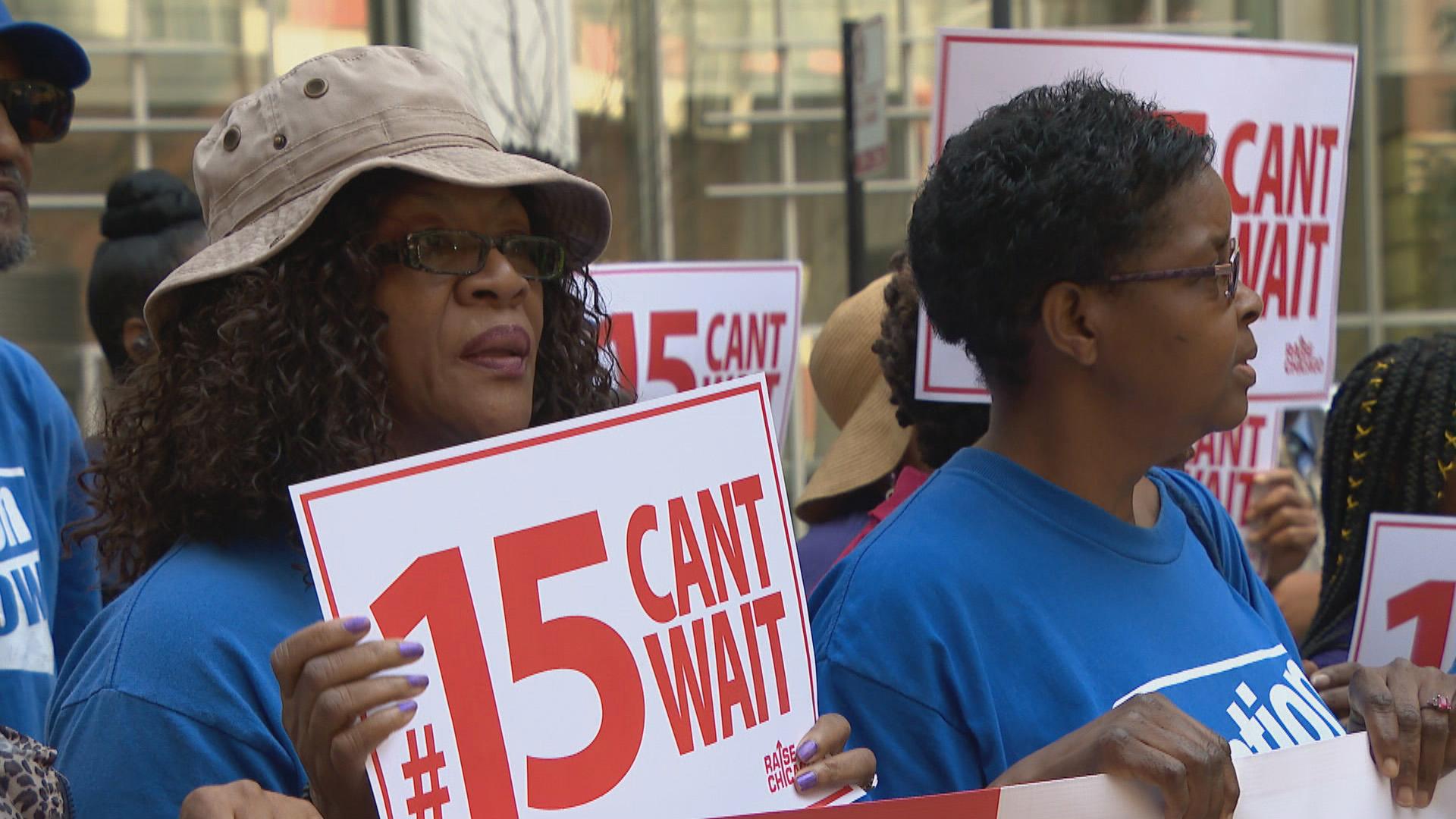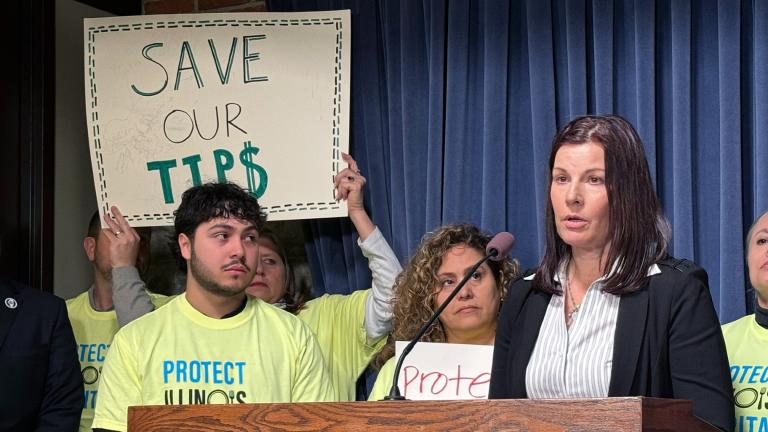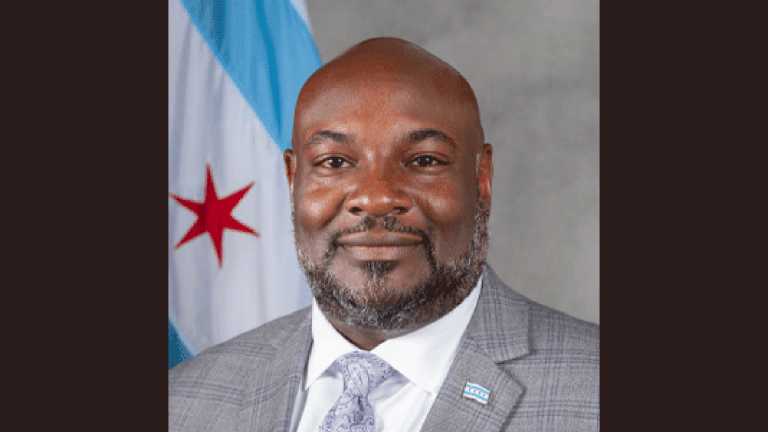 Labor activists join some public officials downtown for a rally in support of raising the minimum wage in August 2019. (WTTW News)
Labor activists join some public officials downtown for a rally in support of raising the minimum wage in August 2019. (WTTW News)
Chicago’s minimum wage will rise to $15 per hour Thursday, capping a six-year fight that energized the labor movement and fueled new laws designed to improve the working conditions for the city’s lowest-paid workers.
The $1 hike in the city’s minimum wage was signed into law by Mayor Lori Lightfoot as part of the city’s 2020 spending plan.
The minimum wage for employees of businesses with four to 20 workers will rise 50 cents per hour to $14 per hour, rising another dollar on July 1, 2023. Youth workers will see their minimum wage rise to $11 per hour. Approximately 400,000 Chicagoans will get a raise starting Thursday, city officials said.
The minimum hourly wage for employees of large Chicago businesses who earn tips will rise by 60 cents on Thursday to $9 per hour. The so-called tipped minimum wage has gone up $2 since 2019.
The state’s $10 per hour minimum wage is set to rise by $1 on Jan. 1, 2022, until it hits $15 per hour in 2025. Approximately 1.4 million Illinois residents earn the state’s minimum wage.
The minimum wage in Cook County outside of Chicago will remain at $13 per hour because the unemployment rate in 2020 was greater than 8.5%, officials said. The tipped minimum wage in Cook County rose to $6.60 on Jan. 1.
“The Cook County Minimum Wage Ordinance balances the needs of appropriate working wages with the needs of our local businesses for a fair compromise,” said Nick Mathiowdis, a spokesperson for Cook County Board President Toni Preckwinkle.
The federal minimum wage is $7.25 per hour, and efforts to hike it failed to pass the U.S. Senate earlier this year.
Chicago’s minimum wage will now rise automatically every July 1 to keep pace with the annual increase in the cost of living.
The city’s Progressive Caucus pushed Lightfoot to eliminate the tipped minimum wage as part of the city’s 2020 spending plan, but Lightfoot opposed the change, saying it could hurt small businesses.
However, city officials agreed to study the “economic impact of tipped wages and the effectiveness of current enforcement” in 2020. Delayed by the pandemic, that yearlong study will now start Thursday.
Under a deal signed by former Mayor Rahm Emanuel, the city’s hourly minimum wage rose from $8.25 to $13 in 2018.
During the 2019 campaign for mayor, Lightfoot vowed to increase the city’s hourly minimum wage and has pointed to its rise as one of her proudest accomplishments.
The nationwide Fight For $15 movement, which was backed by the Chicago Federation of Labor, pushed the challenges facing Chicago’s lowest-paid workers — who are primarily Black and Latino — to the top of the agenda for city officials.
Led by former Ald. Ameya Pawar (47th Ward), the city began requiring employers to give their workers paid time off when they are ill in 2017, and the City Council approved a measure expanding that right earlier this month.
Chicago’s newly expanded worker protection laws will require employers to pay the city's approximately 8,000 domestic workers the city’s minimum wage starting Aug. 1, and requires that they get a written contract “to ensure the accountability, transparency and predictability that they need to plan for themselves and their families” by Jan. 1, 2022.
In addition, the new law is designed to prevent large corporations with more than one location from undercounting their employees to avoid paying the city’s minimum wage.
As part of the last budget from former Mayor Rahm Emanuel in 2019, he proposed creating the city’s Office of Labor Standards to enforce the city’s sick leave and minimum wage laws as well as the city’s so-called “fair work week” ordinance, which requires employers to give their workers two weeks’ notice of their schedules in an effort to reduce the stress caused by unpredictable shift work.
When the COVID-19 pandemic hit, the City Council charged the Office of Labor Standards with enforcing laws designed to protect employees from retaliation for quarantining or taking time off to get vaccinated.
The Office of Labor Standards received 728 complaints, opened 214 investigations, cited 50 employers, and levied $170,500 in fines in 2020 for non-compliance with the city’s worker protection laws, officials said.
Forty-eight employers cited by city officials violated the minimum wage law, triggering $146,500 in fines, officials said.
Contact Heather Cherone: @HeatherCherone | (773) 569-1863 | [email protected]








